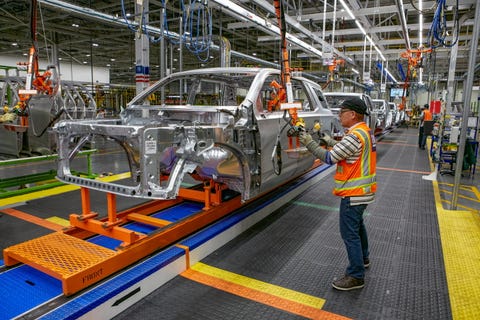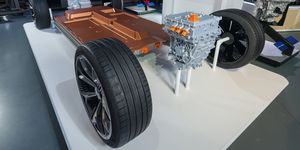
Jim Frenak-FPI Studios/General Motors
- The Reuters news service obtained the production plans of Ford and General Motors, which showed that SUVs and pickups, not electric vehicles, are what’s coming.
- Executives for the automakers cited the need to not exceed market demand for electric vehicles.
- The two automakers are investing heavily to develop the technology over the coming years.
The electric future may not be quite what Ford and General Motors have described it to be, Reuters revealed today. According to production plans the outlet obtained, the two Detroit-based automakers don’t have plans to part with their money-making SUVs and pickups, even as they have promised more electric vehicles are on the way.
Combined, Ford and GM plan to make five million SUVs and pickups in 2026 while building just 320,000 electric vehicles; Tesla built over 365,000 vehicles in 2019. Electric vehicles will amount to 5 percent of the automaker’s total production by 2026, according to the production plans Reuters reported on.
The plans are at odds with some of the electric future plans the two automakers have been touting as their way forward. GM CEO Mary Barra said last fall that in the near future the company is aiming sell one million electric vehicles a year. The company has declared it will have 20 new EVs on the market by 2023, spending $20 billion by 2025 on electric and autonomous tech. Ford CEO Jim Hackett has said that his company plans to develop 40 new full-electric and hybrid vehicles, spending $11 billion by 2022 to do so.
In the past decade, SUVs and pickups have been a big portion of GM and Ford’s business, propelled especially by a decline in gas prices. Both companies have shifted their resources from passenger cars to larger vehicles; GM has cut the Chevrolet Cruze, Volt, and Impala as well as the Buick LaCrosse, while Ford killed the Taurus, Fusion, and Fiesta.
Industry data reviewed by Reuters says that U.S. production of SUVs will be eight times larger than that of traditional cars by 2026, with 93 percent of the SUVs being gasoline powered. From last year to 2026, SUVs and pickups are expected to increase 5 percent as a proportion of total production, from 82 percent to 87 percent, for the two automakers.
Executives at each company told Reuters that the automakers didn’t want to surpass demand for electric vehicles but were still serious about launching more EVs going forward. In 2019, global electric vehicle sales amounted to 2.2 million, or 2.5 percent of the total market share, according to InsideEVs.
Nonetheless, the macroeconomic environment could be adding strain to a transition to electric vehicles. The recent drop in the price oil has pushed gas prices in the U.S. to just above $2, according to AAA, which will only boost the appeal of larger vehicles such as SUVs and pickups.
On top of that, Morgan Stanley auto analyst Adam Jonas told Reuters that a possible recession and the impact it would have on automakers’ earnings could make it more challenging for manufacturers to fund transition to electric vehicles.
Source: Motor - aranddriver.com





